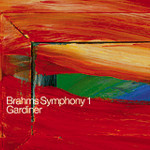
Symphony No 1 in C minor / Schicksalslied, Op. 54
 $35.00
Out of Stock
$35.00
Out of Stock6+ weeks add to cart
BRAHMS
Symphony No 1 in C minor / Schicksalslied, Op. 54
Monteverdi Choir / Orchestre Revolutionnaire et Romantique / John Eliot Gardiner
[ Soli Deo Gloria / CD ]
Release Date: Wednesday 1 October 2008
This item is currently out of stock. It may take 6 or more weeks to obtain from when you place your order as this is a specialist product.
"Gardiner give us a fresh new look into an old symphonic workhorse while in the process all sounds new as if it was the first time we heard it. In this aspect Gardiner's realization is superlative and demands a listening." (AudAud.com)
MARBECKS STAFF PICK - BEST RECORDINGS 2008
MusicWeb - Recording of the Year 2008
"Gardiner emulates the classical indications of Brahms well beyond Toscanini, Markevitch and Steinberg's stylish performances although this is not a romantic symphony running wild by any means. The innocent sound concentrates on the beauty of the phrasing and what the notes have to say for a purer "classical" sound replete of subtle colorations from left to right and from back to front, from the brasses and woodwinds to the string choir. Gardiner's is an optimistic performance of an optimistic Brahms and although there is no obvious program in this music the most obvious feeling is one of optimism thanks to the enlightened approach. It is just as commendable the pairing of this symphony with three other choral works which in a way anticipate Brahms' symphonic stance. Gardiner's performance compares well against those heavy leaden interpretations exemplified by the likes of Furtwangler, Karajan, Böhm or Bernstein. He give us a fresh new look into an old symphonic workhorse while in the process all sounds new as if it was the first time we heard it. In this aspect Gardiner's realization is superlative and demands a listening." (AudAud.com)
SDG is proud to be releasing a new series that sees John Eliot Gardiner and his Orchestre Révolutionnaire et Romantique explore the music of Johannes Brahms.
Importantly, Gardiner has set Brahms' symphonies in the context of his own superb and often neglected choral music, and that of the old masters he particularly cherished (Schütz and Bach especially) and of recent heroes of his (Mendelssohn, Schubert and Schumann). In doing so, Gardiner gains a new perspective on his symphonic compositions, drawing attention to the intrinsic vocality at the heart of his writing for orchestra.
The recordings from this series are drawn from Gardiner's two-year Brahms and his Antecedents project which is in two parts. The first segment of the project, featuring the first two symphonies and the German Requiem, began in October 2007 and included two concerts at the newly reopened Royal Festival Hall. The second part of the project featuring the 3rd and 4th symphonies - also in a historical and vocal context - will take place in September/October 2008.
This project not only celebrates Brahms the composer, but traces the roots from which Brahms drew his creative inspiration. No other composer of the 19th century had such a close and informed relationship to music of the past and for this reason, great choral works by composers as varied as Bach, Schütz and Mendelssohn are performed alongside Brahms' compositions.
This series is an important milestone for SDG heralding the development of the label beyond the music of Johann Sebastian Bach and the Renaissance choral repertoire which have so far dominated its catalogue.
This release is the first in the series and coincides with the second part of Gardiner's project, which will be touring extensively in Europe during autumn 2008.
This exciting new recording combines the large-scale vigour, drama and passion of Brahms with the expert musicianship and authentic approach that has come to be expected of John Eliot Gardiner, The Monteverdi Choir and his superb Orchestre Révolutionnaire et Romantique.
Unique to this recording is the way in which Brahms' Symphony is set within its historical and vocal context. As Gardiner explains:
"When we approach Brahms nowadays the temptation is to concentrate exclusively on his orchestral output - the overtures, concertos and symphonies - and replicate a safe 'meat-and-two-veg' approach. But the more I thought about it, the more convinced I became that a worthwhile approach would be to juxtapose his symphonies with vocal music - music which Brahms himself cherished (studied, edited and conducted) - and so to set them in a historical Brahms-specific context rather presenting an encyclopaedic survey of all his orchestral output".
For this project, Gardiner not only explores Brahms' musical origins but he attempts to reveal the very sounds which inspired him. Such authenticity has been sought by using instruments favoured by the composer. Valveless natural horns, for instance, give exactly the right flavour to the haunting, valley-resounding alphorn theme in the finale of the First Symphony.
Tracks:
Brahms - Begräbnisgesang, Op. 13
Mendelssohn - Mitten wir in Leben sind Op. 23
Brahms - Schicksalslied, Op. 54
Brahms - Symphony no.1 in c minor, Op. 68

![Brahms: Ein Deutsches Requiem, Op. 45 [German Requiem] (with works by Schutz) cover](https://images.marbecks.co.nz/_thumbnails/10197/10197253.jpg)